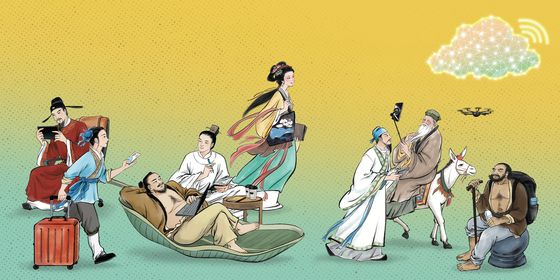Five idioms related to numbers
Numbers have special meanings in China, though not all of them are traditional. It’s well-known that “four” (四, sì) is considered unlucky because it sounds similar to the word for “death” (死, sǐ); and “eight” (八, bā) represents wealth because the character (发, fā), meaning “to make a fortune,” has a similar pronunciation.
Numbers continue to gain new meanings as netizens incorporate them into internet slang. In the online era “666” means “awesome,” and “520” expresses love.
Below, we explore further the many meanings of different numerals in China, by introducing some of the idioms and chengyu inspired by numbers:
一干二净 One’s dry two’s clean
干净 on its own means “clean,” and when combined with 一 and 二, the resulting idiom means “thoroughly” or “completely.” This chengyu is often used to describe something that has been cleaned spotlessly, or wiped out (as in destroyed), but can also be used to indicate when one completely forgets about something.
The office was cleaned up spotlessly.
Bàngōngshì bèi dǎsǎo de yì gān èr jìng.
办公室被打扫得一干二净。
接二连三 Connecting two linking three
Literally, 接二连三 translates to “connect two with three.” The idiom is used to mean one after another, repeatedly, or in quick succession.
She asked him strange questions one after another.
Tā jiē èr lián sān de xiàng tā wèn qíqí guàiguài de wèntí.
她接二连三地向他问奇奇怪怪的问题。
言三语四/说三道四 Talking three saying four
Both of these idioms mean the same thing: to gossip.
I can’t stand people who gossip.
Wǒ shòubuliǎo shuō sān dào sì de rén.
我受不了说三道四的人。
四分五裂 Divided into four, split into five
In Chinese, to be “divided into four and split into five” is similar to being “at sixes and sevens” in English. This idiom refers to disunity, a state of falling apart, or disintegration. It first appeared in The Strategies of the Warring States (composed around 195 BCE).
This soccer team is already at sixes and sevens.
Zhège zúqiúduì yǐjīng sì fēn wǔliè le.
这个足球队已经四分五裂了。
五脏六腑 Five solid organs, six hollow organs
This phrase originated from TCM’s concept of “inner organs.” 五脏 refers to the five yin organs: spleen, lungs, kidneys, liver, and heart. 六腑 refers to the six yang organs, the stomach, gall bladder, large intestine, small intestine, bladder, and spleen. The idiom can be used in a metaphorical way to refer to the internal situation of an industry, group, or organization.
He fell hard to the ground, and his entire body hurt.
Tā zhòngzhòng shuāidǎo zài dì, gǎnjué wǔzǎng liùfǔ dōu téng de lìhai.
他重重摔倒在地,感觉五脏六腑都疼得厉害。
Cover image by Magda Ehlers from Pexels












